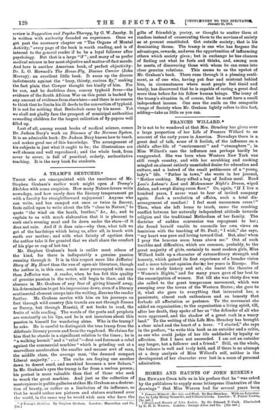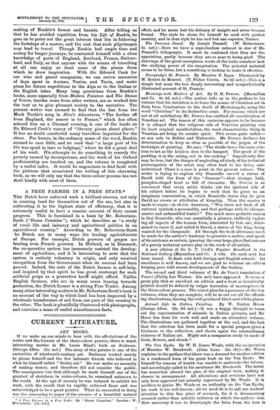HOMES AND BAUNTS OF JOHN RUSKIN:I- SM EDWARD CooK tells
us in his preface that he "was asked by the publishers to supply some letterpress illustrative of the drawings" that Miss Warren had for several years been
• Frances Willard : Her Life and Work. By Ray Strachey. With an Introduc- tion by Lady Henry Somerset, and 8 Illustrations. London : T. Fisher [5s. set.] t Homes and Haunts of John Ruskin. By Sir Edward T. Cook. Illustrated by E. M. B. Warren. London : George Allen and Co. [21s. net.]
making of Ruskin's homes and haunts. After telling us that he has avoided repetition from his Life of Ruskin, he goes on to point out the great interest that lies in following the footsteps of a master, and the zest that such pilgrimages may lend to travel. Though Ruskin had ample time and money for longer journeys, he contented himself with a close knowledge of parts of England, Scotland, France, Switzer- land, and Italy, so that anyone with the means of travelling at all can enjoy at least some of the places from which he drew inspiration. With Sir Edward Cook for our wise and genial companion, we can revive memories of days spent in Amiens, Venice, and Turin, and make plans for future expeditions to the Alps or to the Italian or the English lakes. Many long quotations from Ruskin's books, more especially from Modern Painters and The Stones of Venice, besides some from other writers, are so worked into the text as to give pleasant variety to the narrative. The present writer was amused to find that the line from the Mock Turtle's song in Alice's Adventures, "The farther off from England, the nearer is to France," which has often solaced him on a Channel crossing, is one of the beads on Sir Edward Cook's rosary of "literary pieces about places." It has no doubt comforted many travellers impatient for the shore. For homes, in the ordinary sense of the word, Ruskin seemed to care little, and we read that " a large part of his life was spent in inns or lodgings," where he did a great deal of his work. His attempts to do something to remedy the poverty caused by incompetence, and the work of his Oxford professorship are touched on, and the volume is completed by a useful index. It would be ungracious to find fault with the pictures that occasioned the writing of this charming book, so we will only say that the three-colour process has not dealt kindly with most of them.



























































 Previous page
Previous page